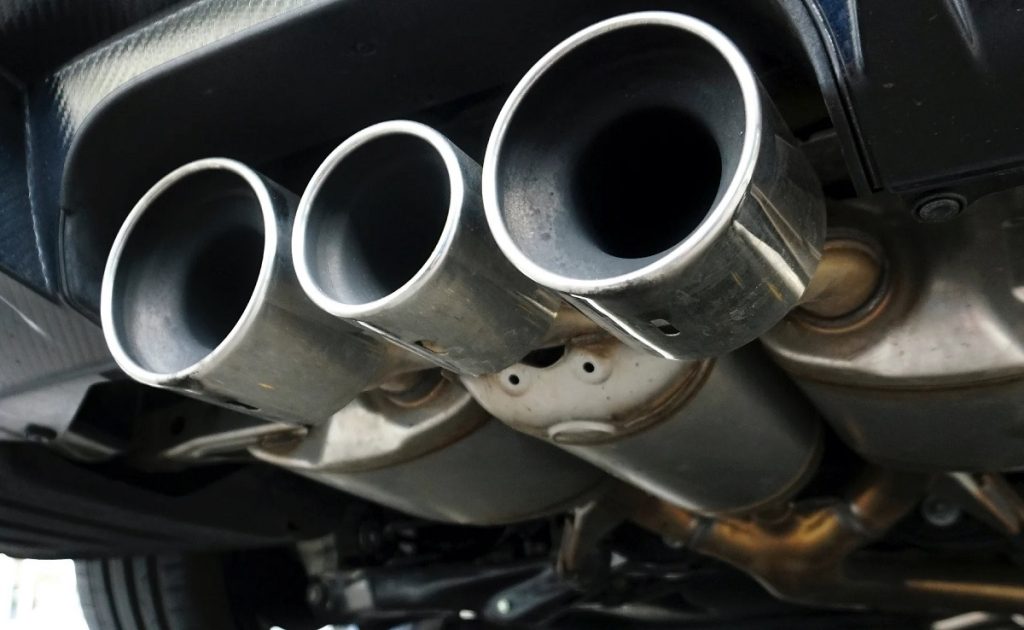Have you ever found yourself marveling at the intricacies of your car’s exhaust system? From the growl of the engine to the subtle hum of the exhaust, every aspect plays a crucial role in shaping your driving experience. Yet, amidst the array of components that make up this vital system, one question often lingers in the minds of curious motorists: “What metal is an exhaust pipe made from?”
In the realm of automotive engineering, the choice of material for an exhaust pipe is far from arbitrary. It involves a careful consideration of factors such as performance, durability, cost-effectiveness, and environmental impact. In this comprehensive guide, we embark on a journey to unravel the mysteries behind exhaust pipe materials, shedding light on their properties, applications, and the intricate dance between form and function.
Understanding the Basics: The Role of Exhaust Pipes
Before delving into the specifics of exhaust pipe materials, it’s essential to grasp the fundamental role these components play within the broader context of a vehicle’s exhaust system.
1. What Does an Exhaust Pipe Do?
At its core, an exhaust pipe serves as a conduit for guiding exhaust gases away from the engine and safely dispersing them into the atmosphere. However, its significance extends beyond mere transportation; it also contributes to noise reduction, emission control, and overall engine performance.
2. Key Functions of an Exhaust Pipe
- Exhaust Gas Flow: Channels hot and toxic exhaust gases away from the engine compartment, preventing heat buildup and potential damage.
- Noise Reduction: Utilizes specialized design features and sound-dampening materials to minimize engine noise, ensuring a quieter ride for occupants.
- Emissions Control: Incorporates catalytic converters and other emission-control devices to reduce harmful pollutants before they are released into the air.
Types of Metals Used in Exhaust Pipes
With a foundational understanding of exhaust pipe functionality in place, let’s now explore the diverse array of metals employed in their construction and the unique characteristics that distinguish each material.
1. Stainless Steel: The Workhorse of Exhaust Systems
Renowned for its exceptional corrosion resistance and longevity, stainless steel stands as a stalwart champion among exhaust pipe materials. Its chromium-rich composition forms a protective oxide layer, shielding the underlying metal from rust and degradation. Within the realm of stainless steel, two primary grades reign supreme:
- 304 Stainless Steel: Known for its versatility and resistance to high temperatures, 304 stainless steel finds widespread use in exhaust systems where durability and aesthetic appeal are paramount.
- 409 Stainless Steel: With its superior heat resistance and cost-effective price point, 409 stainless steel strikes a balance between performance and affordability, making it a popular choice for OEM and aftermarket applications alike.
2. Mild Steel: A Budget-Friendly Alternative
Despite its susceptibility to corrosion, mild steel remains a prevalent option for exhaust pipe construction, particularly in budget-conscious scenarios. Also referred to as carbon steel, it offers commendable strength and weldability at a fraction of the cost of stainless steel counterparts. However, diligent maintenance and corrosion prevention measures are essential to prolong its lifespan and prevent premature failure.
3. Aluminized Steel: Combining Strength with Corrosion Resistance
In the quest for an optimal balance between strength, affordability, and corrosion resistance, aluminized steel emerges as a compelling contender. This substrate consists of a layer of aluminum-silicon alloy deposited onto a steel base, providing robust protection against rust and oxidation. Aluminized steel finds favor in a variety of automotive applications, including exhaust systems, where it offers durability without breaking the bank.
4. Titanium: The Ultimate Performance Upgrade
For enthusiasts seeking to extract every ounce of performance from their vehicles, titanium exhaust systems represent the pinnacle of engineering excellence. Renowned for its extraordinary strength-to-weight ratio and heat resistance, titanium offers unrivaled performance benefits for high-performance applications. While its premium price tag may deter budget-conscious consumers, the weight savings and enhanced durability it affords are well worth the investment for serious enthusiasts and professional racers alike.
Factors Influencing Material Selection
The decision-making process behind selecting the optimal material for an exhaust pipe is influenced by a myriad of factors, each bearing its weight in the equation of performance, longevity, and cost-effectiveness. (See Also: What Other Year Seats Fit in 2005 F150? Expert Guide)
1. Cost Considerations
In an era where economic prudence reigns supreme, the cost of materials plays a pivotal role in determining the viability of a particular option. While stainless steel and titanium may command a premium price, their durability and longevity often justify the initial investment over the lifespan of the vehicle. Conversely, mild steel and aluminized steel offer more budget-friendly alternatives without sacrificing essential performance attributes.
2. Performance Requirements
For enthusiasts and professional drivers pushing the limits of performance, the choice of exhaust pipe material can make a world of difference in unlocking the full potential of their vehicles. Titanium’s lightweight construction and exceptional heat resistance make it the material of choice for high-performance applications where every gram counts. Conversely, for everyday commuters seeking a balance between reliability and affordability, stainless steel or aluminized steel may suffice without compromising performance.
3. Environmental Considerations
As the automotive industry continues its quest for sustainability and environmental stewardship, the materials used in exhaust systems must align with stringent emissions regulations and environmental standards. Materials such as stainless steel and titanium offer inherent corrosion resistance and longevity, reducing the likelihood of premature component failure and the associated environmental impact. Additionally, the incorporation of catalytic converters and other emission-control devices further mitigates the ecological footprint of modern vehicles, ensuring compliance with regulatory mandates while safeguarding air quality for future generations.
Expert Tips for Selecting the Right Exhaust Pipe Material
When it comes to upgrading or replacing your vehicle’s exhaust system, choosing the right material for the exhaust pipe is paramount. From performance enthusiasts seeking optimal power gains to everyday drivers prioritizing durability and longevity, selecting the appropriate material can make a significant difference in both functionality and satisfaction. Here are some expert tips to guide you through the decision-making process:
1. Consider Your Driving Habits and Environment
Before diving into the realm of exhaust pipe materials, take a moment to assess your driving habits and the environment in which your vehicle operates. Are you a spirited driver who enjoys pushing the limits on winding roads, or do you stick to city streets and highways for daily commuting? Additionally, consider factors such as climate, weather conditions, and road salt exposure, as these can impact the longevity and corrosion resistance of different materials.
2. Evaluate Performance vs. Cost Trade-offs
While titanium may offer unparalleled performance benefits for track enthusiasts and professional racers, its premium price tag may be prohibitive for budget-conscious consumers. Conversely, stainless steel and aluminized steel provide a compelling balance between performance, durability, and affordability for the average driver. Evaluate the trade-offs between performance and cost to determine the best fit for your needs and budget.
3. Consult with Automotive Experts and Enthusiasts
Don’t hesitate to seek advice from automotive experts, enthusiasts, and professionals who have firsthand experience with exhaust systems and materials. Online forums, social media groups, and automotive communities can be valuable resources for gathering insights, recommendations, and real-world feedback on different exhaust pipe materials and their performance in various applications. By tapping into the collective wisdom of fellow enthusiasts, you can make a more informed decision and avoid potential pitfalls.
4. Prioritize Longevity and Corrosion Resistance
In regions with harsh climates or high levels of road salt exposure, corrosion resistance becomes a critical factor in selecting an exhaust pipe material. Stainless steel, with its inherent resistance to rust and oxidation, is an excellent choice for environments prone to corrosion. Additionally, proper maintenance and regular cleaning can help prolong the lifespan of your exhaust system, regardless of the chosen material.
5. Invest in Quality and Reliability
When it comes to automotive components, quality and reliability should always take precedence over short-term cost savings. While opting for a cheaper material may seem tempting initially, investing in a high-quality exhaust system constructed from reputable materials can save you time, money, and headaches in the long run. Look for trusted manufacturers with a proven track record of producing durable, high-performance exhaust components backed by warranties and customer support. (See Also: What Is a Running Board on a Truck? | Everything You Need to Know)
6. Customize to Suit Your Needs and Preferences
Every driver has unique preferences and priorities when it comes to their vehicle’s exhaust system. Whether you’re seeking a subtle improvement in sound and performance or aiming for maximum horsepower gains and head-turning aesthetics, consider customizing your exhaust system to align with your specific needs and preferences. From selecting the ideal material and diameter to choosing between different muffler designs and exhaust tip styles, customization offers endless possibilities for tailoring your exhaust system to suit your individual taste and driving style.
7. Stay Informed and Keep Learning
The automotive industry is constantly evolving, with new technologies, materials, and innovations shaping the landscape of exhaust system design and performance. Stay informed and keep learning about the latest advancements in exhaust pipe materials, manufacturing techniques, and performance upgrades to stay ahead of the curve and make informed decisions when upgrading or replacing your vehicle’s exhaust system. By staying curious, open-minded, and engaged with the automotive community, you can continue to enhance your driving experience and unlock the full potential of your vehicle’s exhaust system.
Whether you’re a seasoned enthusiast or a novice driver embarking on your automotive journey, these expert tips can help steer you in the right direction when selecting the perfect exhaust pipe material for your vehicle. By considering factors such as driving habits, performance requirements, environmental conditions, and budget constraints, you can make a well-informed decision that enhances both the functionality and enjoyment of your driving experience.
Frequently Asked Questions About Exhaust Pipe Materials
As you explore the world of automotive exhaust systems and the materials used in their construction, you’re bound to encounter a range of questions and queries. From inquiries about the durability of stainless steel to concerns about the performance benefits of titanium, we’ve compiled a list of frequently asked questions to provide clarity and guidance on this complex topic. Read on to discover the answers to some of the most common queries regarding exhaust pipe materials:
1. What are the advantages of stainless steel exhaust pipes?
Stainless steel exhaust pipes offer numerous advantages, including exceptional corrosion resistance, durability, and longevity. The chromium-rich composition of stainless steel forms a protective oxide layer that shields the metal from rust and degradation, making it ideal for harsh environments and prolonged use.
2. Is titanium really worth the investment for an exhaust system?
While titanium exhaust systems come with a premium price tag, they offer unparalleled performance benefits for enthusiasts seeking maximum power gains and weight savings. Titanium’s exceptional strength-to-weight ratio, heat resistance, and corrosion resistance make it a preferred choice for high-performance applications where every gram counts.
3. Are aluminized steel exhaust pipes as durable as stainless steel?
Aluminized steel exhaust pipes offer robust corrosion resistance and durability at a more affordable price point compared to stainless steel. While they may not match the longevity of stainless steel in extreme conditions, aluminized steel exhaust pipes provide a cost-effective solution for drivers seeking reliable performance without breaking the bank.
4. How does the choice of exhaust pipe material impact vehicle performance?
The choice of exhaust pipe material can have a significant impact on vehicle performance, particularly in terms of weight savings, exhaust flow efficiency, and heat dissipation. Lightweight materials like titanium can enhance acceleration and horsepower gains, while corrosion-resistant materials like stainless steel ensure optimal exhaust system performance over time. (See Also: Can You Use Galvanized Pipe for Exhaust? Tips & Risks Explained)
5. What maintenance is required for different types of exhaust pipe materials?
Maintenance requirements vary depending on the type of exhaust pipe material used. Stainless steel requires minimal maintenance due to its inherent corrosion resistance, while mild steel and aluminized steel may require periodic cleaning and corrosion prevention measures to prolong their lifespan. Titanium exhaust systems typically require little maintenance beyond occasional cleaning to maintain their appearance.
6. Can I upgrade my exhaust system with aftermarket components?
Yes, you can upgrade your vehicle’s exhaust system with aftermarket components to improve performance, sound, and aesthetics. However, it’s essential to choose compatible components designed for your specific make and model to ensure proper fitment and functionality. Additionally, consider factors such as material quality, warranty coverage, and emissions compliance when selecting aftermarket exhaust components.
7. How do I know which exhaust pipe material is best for my vehicle?
Selecting the best exhaust pipe material for your vehicle depends on various factors, including your driving habits, performance goals, budget constraints, and environmental conditions. Consult with automotive experts, enthusiasts, and reputable manufacturers to evaluate your options and make an informed decision based on your specific needs and preferences.
By addressing these frequently asked questions, we aim to provide clarity and guidance on the topic of exhaust pipe materials, empowering you to make informed decisions when upgrading or replacing your vehicle’s exhaust system. Whether you’re seeking durability, performance, or affordability, understanding the characteristics and advantages of different materials is key to enhancing your driving experience.
Conclusion
In the realm of automotive engineering, the question of “What metal is an exhaust pipe made from?” serves as a gateway to a vast and intricate landscape of materials science, performance optimization, and environmental responsibility. Whether it’s the time-tested reliability of stainless steel, the cost-effective practicality of mild steel, or the cutting-edge performance of titanium, each material offers a unique blend of attributes to suit the diverse needs and preferences of drivers worldwide.
As you embark on your journey of automotive exploration, armed with newfound knowledge and appreciation for the nuances of exhaust pipe materials, may you traverse the highways and byways with confidence, knowing that beneath the surface lies a symphony of engineering excellence, craftsmanship, and unwavering dedication to the pursuit of automotive perfection. So, the next time you find yourself behind the wheel, take a moment to ponder the humble exhaust pipe and the myriad possibilities it represents—a testament to human ingenuity and the enduring spirit of innovation.



